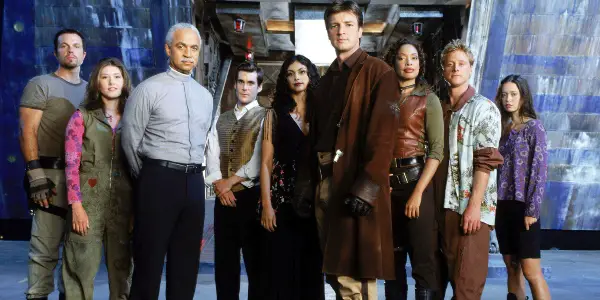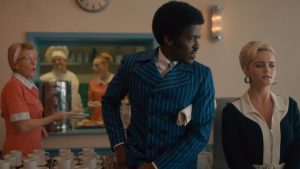
Anybody who knows me knows I love science fiction. And no science fiction TV series – heck, any series at all – has quite resonated with me the way Firefly does. It’s got razor-sharp wit, distinct and memorable characters, thrilling action. But what truly seals the deal is just how eclectic those central characters are. It’s not just a fun sci-fi show, it’s got something to say.
What’s It About?
For those unfamiliar, the series revolves around Malcolm Reynolds (the great Nathan Fillion), a bandit-for-hire who once fought in (and lost) the war against The Alliance, a nefarious force determined to colonize the galaxy and force everyone to conform. Nowadays, on his ship simply known as Serenity, he and his crew take any job they can, legal or illegal, in order to keep gas in the tank, food on the table, and money in their wallets. When the group unknowingly take on board two fugitive siblings named Simon (Sean Maher) and River Tam (Summer Glau), they find themselves on the run from The Alliance, all while contending with seedy crime lords and even flesh-eating Reavers.
source: 20th Century Fox Television
Why Is It Just So Cool?
One thing that sets this show apart from the crowd for me is its mix of futuristic sci-fi and old-school spaghetti western regarding the aesthetics. The landscapes, the crew’s costumes and the production design all feel like something you might see in, say, Tombstone. The computer-generated VFX, for a basic cable show, also blend rather well with the in-camera elements. But the real achievement in these technical aspects is how they signify class divide. High-society officials and organizations are much more fancy (or “shiny”, as the characters might say), whereas those in the middle-and-lower-class are in rather raggedy clothes, with run-down living quarters. It’s a potent meditation on social inequality that’s succinctly conveyed just through the visuals.
There’s also creator Joss Whedon‘s trademark snappy dialogue, which is bolstered in its staying power by the interplay of the cast. Everybody can take it as well as they can dish it out. That, and all the members of the Serenity have incredibly distinct personalities. There’s Kaylee (Jewel Staite), the mechanic, Inara (Morena Baccarin), the courtesan, Jayne (Adam Baldwin), the weapons expert, Shepherd Book (Ron Glass), a preacher, Wash (Alan Tudyk), the pilot, Zoe (Gina Torres), Mal’s second-in-command. Plus the aforementioned Simon serves as the ship’s medic. Everybody has different worldviews, sexualities, religious beliefs (or lack thereof) and personalities. Yet, at the end of the day, they come to form a family. As an autistic person, as well as a member of the LBGBTQ+ community, that reaches me at my core.
source: 20th Century Fox Television
Why Do I Love It?
There’s even more to the story for me personally, which requires me to go more in-depth about two characters in particular: Mal and River. Mal, a once-religious man who lost a war whilst fighting for a cause he felt was righteous, has left behind all he once believed in, and keeps himself closed off from his crew, often through a thick sheen of sarcasm. While I’ve never been a religious person myself, I have known the struggles of depression intimately, and Mal’s push and pull between connection with the crew, or retreating inward, rings painfully true, which makes for a cathartic experience.
River I also connect with in relation to her struggles with mental illness. I won’t give away any secrets about her past, since that’s an integral part of the story’s intrigue. However, I will say that in addition to River’s own past traumas, she’s a psychic and empath who can feel the emotions and physical sensations of others, piling the memories of their trauma onto her own. Dealing day in and day out with any sort of mental illness or trauma is a constant struggle, and while the series didn’t quite get the chance to conclude River’s arc (the film continuation Serenity (2005) would do the job after the show grew a large cult following), the writing and performance portray the role with sheer sensitivity. River is also not defined by her pain and tragedy. Every bit of Summer Glau‘s delivery and physicality conveys a complex person who simply wants to live her life without the burden of this unwanted damage. After Mal, she’s the most poignant character on the show.
source: 20th Century Fox Television
Closing Thoughts
In the end, Firefly is full of not only wit, style and imagination, but a burning compassion for its characters, along with their individual differences. Being autistic and bisexual, both inextricable parts of myself that deviate from the norm of who people are expected to be, allows me to latch onto the show’s central theme of diversity effortlessly. Throw in the touching exploration of mental illness, and you’ve got a program that is not only fun- my ultimate comfort show, in fact- but a raw emotional powerhouse that brings me great catharsis every time, and reminds me why it’s so crucial for us to take each other as we are.
Does content like this matter to you?
Become a Member and support film journalism. Unlock access to all of Film Inquiry`s great articles. Join a community of like-minded readers who are passionate about cinema – get access to our private members Network, give back to independent filmmakers, and more.








